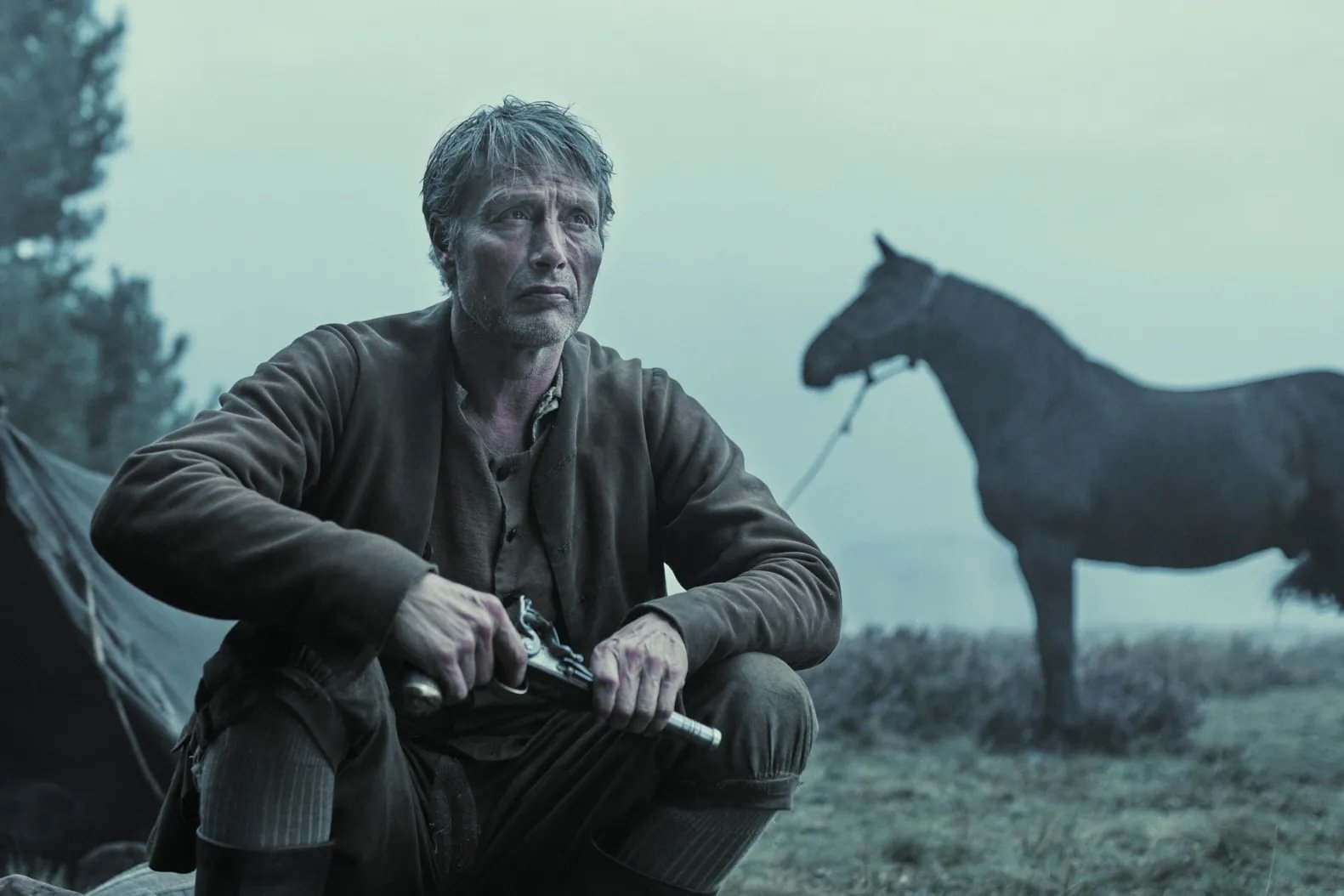Epics on a Small Scale: The Promised Land
Epic films have been around since the near-invention of cinema, dating back to the 1910s with the silent film Cabiria (1914) and persisting throughout the 20th century with the likes of Seven Samurai (1954) and Titanic (1997). Epics are filled with ambition and manage to tell stories surpassing conventions to engage with the universal human spirit. The genre is defined by mythological or historical stories, widescreen vistas, impossible quests, memorable characters, and intricate themes.
It’s rare now to get a film that truly feels “epic” in scope and emotion, especially as the word gets tossed around to market shallow films (looking at you, Rebel Moon). But if you look to Denmark and Nikolaj Arcel’s The Promised Land, we get exactly what’s been missing—a surprising, sweeping, emotional epic.
The Promised Land starts off as a seemingly straightforward historical drama taking cues from the manifest destiny ethos of classic Western films. Captain Ludvig Khalen (Mads Mikkelsen, who can do no wrong) strikes out against the odds to start a settlement on the untamable heath in northern Denmark. Many men have failed. But Ludvig, despite being equipped with a measly captain’s pension from the war and only the tools he can carry on a horse, sets out to prove his worth to the King—a king who doesn’t even know he exists.
Ludvig aspires to be a man of nobility and respect, and to have control of his life. Born the bastard of a lord, and shipped off to the army, Ludvig knows what it is like to be deprived of a good life and agency. With few words, and only a few glances, Mikkelsen hints to Ludvig’s deeper, subconscious reasons for starting the settlement and making a name for himself. In a quietly expressive performance, Mikkelsen retains composure as he lets out tiny flashes of emotion that land like a wave.
Soon after getting set up on a plot of land, Ludvig is invited to dinner at the estate of county judge Frederik de Schinkel (Simon Bennebjerg). We first meet Schinkel—sorry, de Schinkel—in a ridiculous, overly compensating outfit for a “fashion portrait.” It’s at this dinner where we learn who each of these men really are. Ludvig conducts himself with respect and self-control, while de Schinkel acts like a frivolous child who finally meets someone who tells him no. Almost immediately we’re clued into each man’s weak points and how this will become a spiraling psychological and political game of chess. And as HFJ’s Editor-in-Chief put it, [Bennebjerg] is “so good I just wanted to punch him every time he opened his mouth.” Me too.
Bennebjerg may be the year’s greatest villain as he chews up every scene with a tortured spirit, so insecure and unsure of who he is and what he wants that he literally tries to change his name by adding a little “de” prefix. He inherited his worth, and unlike Ludvig, has no aspirations and no understanding of what it means to live a life with dreams or real companionship, and he thrives on taking that from others.
With every twist and turn in his battle with de Schinkel, Ludvig is tested by the growing comfort and idyllic life of his makeshift family. Borne from tragedy, loneliness, and a shared purpose, Ludvig’s companions force him to begin questioning his goals. Ann Barbara, a tenacious and strong-willed runaway peasant, grounds Ludvig, calling out the nonsense that is aristocratic society. Anmai Mus, a young Romani girl who shows up on his doorstep, chips away at Ludvig’s stoicism with her sardonic humor and wonder. And Father Anton Eklund, the young, somewhat naive priest with hopes for community, pushes Ludvig to see the world and life beyond his ambition. For a film packed with brutality, Arcel and team take audiences on a journey that finds hope in those around us.
Dan Romer (Beasts of the Southern Wild, Maniac) adds layers of grace and tragedy to the film, building a lush, classical, and romantic score that makes the hidden emotions of our characters feel as grand as the wide vistas of the heath. Combined with gorgeous cinematography and a deep color palette to match the seasons, Arcel wrings out every drop of nuance from every unsaid word, each passing glance, and the tiniest of seedlings.
The Promised Land surprises as it unravels to become more than a struggle for power and control. The story traces one man’s journey from utmost loyalist to rebel, exploring grand ideas like the cost of ambition, the allure of class, loyalism and faith, shared dreams, and the beauty of makeshift families. In other hands, the true story behind The Promised Land easily could’ve been handled as a sappy melodrama. Instead, Arcel deftly crafts every moment with care that stands in stark contrast to the rushed work of modern blockbusters or unimagininative remakes. In doing so, Arcel reframes modern epics as more than stories of saving the world or soaring amongst the stars. The Promised Land is a reminder that an epic doesn’t need all the bells and whistles we have grown accustomed to—it can be about something seemingly insignificant, like a man trying to farm.



Andy is Senior Film Programmer at Austin Film Festival, Staff Writer for HFJ, and a filmmaker based in Austin, TX. You can find him on Letterboxd @andyvolk31.